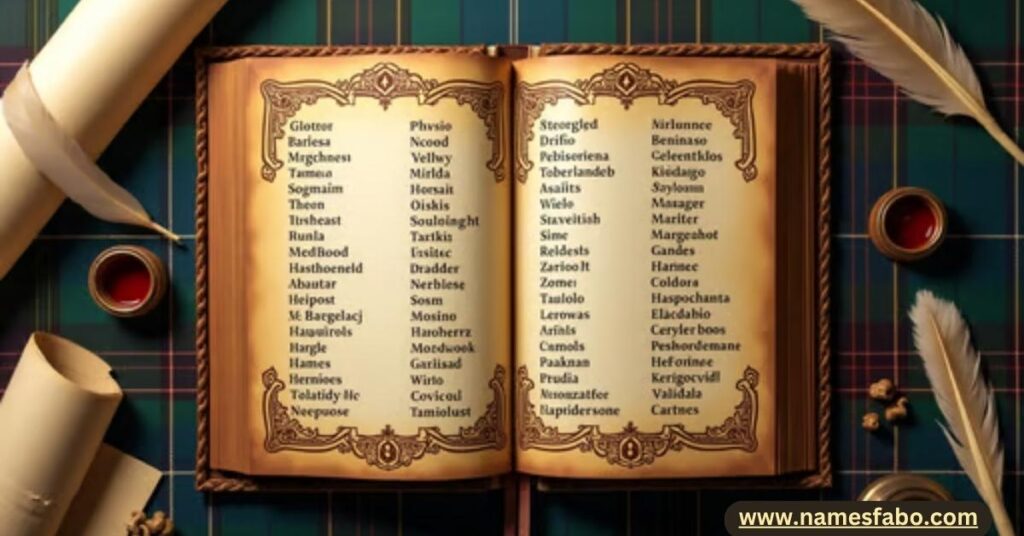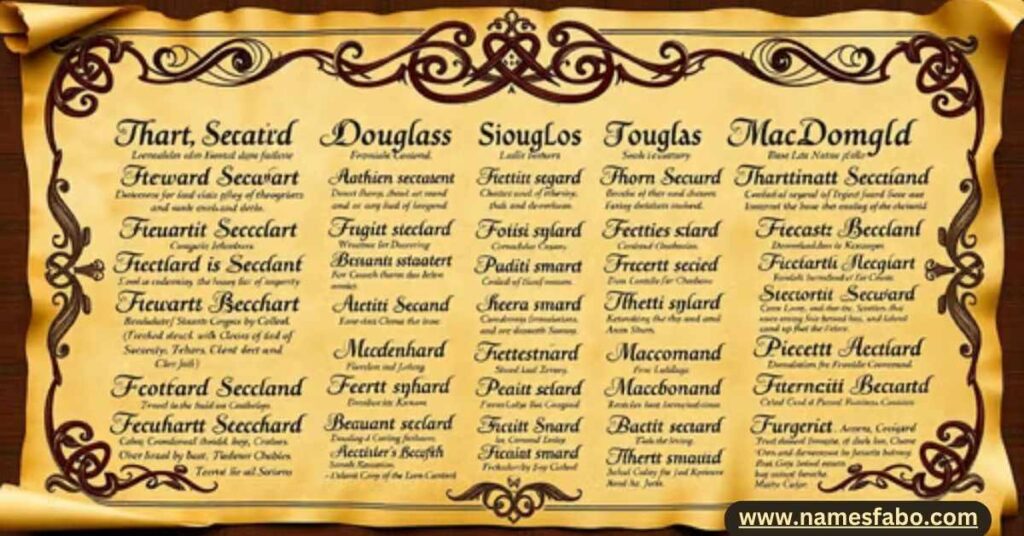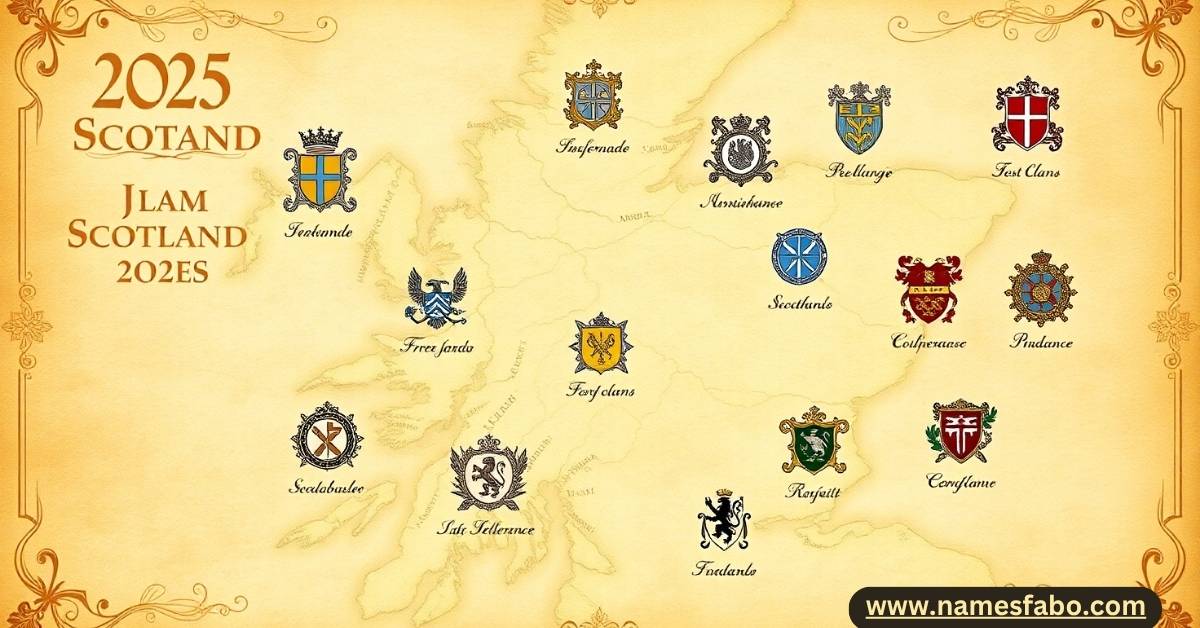Imagine stepping into a Highland mist where ancient castles whisper stories of Scottish clan last names and Gaelic family names that have echoed through centuries. Your surname isn’t just a name it’s a living piece of history that connects you to medieval Scottish clans, warrior bloodlines, and the rugged landscapes of Scotland itself.
Over 35 million Americans claim Scottish heritage, making Scottish last names some of the most sought-after family names in genealogy research today. Whether you’re wondering what does my Scottish surname mean or searching for best Scottish last names for babies, this comprehensive guide reveals the fascinating stories behind Scotland’s most powerful family names.
From ancient Scottish surnames rooted in Gaelic traditions to noble family names Scotland that shaped history, we’ll explore how these names survived centuries of change and continue to inspire families worldwide in 2025.
History of Scottish Last Names
Scotland’s naming journey began long before traditional last names in Scotland became the norm we know today. Ancient Scots lived with single names, often paired with descriptive nicknames that painted vivid pictures of their lives, occupations, or distinctive features.
The transformation from simple names to complex Scottish family history markers happened gradually between 1100-1400 CE. Population growth, land ownership disputes, and the need for better record-keeping pushed Scottish communities toward permanent family identifiers. This wasn’t a sudden change it evolved differently across the Highlands and Lowlands, creating the rich tapestry of Scottish surname categories we see today.
Anglo-Norman Influence on Early Surnames
The Norman conquest of 1066 didn’t stop at England’s borders. By the 1100s, Norman nobles were settling in Scotland, bringing systematic naming conventions that would reshape Scottish naming customs forever. These newcomers introduced structured approaches to family names, blending Norman organizational methods with existing Celtic traditions.
Surnames like Bruce, Stewart, and Fraser emerged from this cultural fusion. Historical last names of Scotland show how Norman efficiency met Celtic creativity, producing names that honored both practical identification needs and deep cultural meanings.
The Ragman Roll and Surname Spread
The Ragman Roll of 1296 stands as Scotland’s most important early surname document. This medieval record captured Scottish nobles pledging allegiance to Edward I of England, preserving a snapshot of surname distribution in Scotland during a crucial historical moment.
This document reveals surname patterns in medieval Scotland, showing how family names clustered in specific regions and how political events influenced surname adoption. Modern genealogists use the Ragman Roll as a starting point for how to trace Scottish last name roots, making it invaluable for ancestry Scottish last names research.
Scottish Name Generator

Understanding authentic Scottish surname etymology requires more than random combinations it demands respect for cultural patterns that developed over centuries. Traditional Scottish names follow specific linguistic rules, incorporating meaningful prefixes like Mac/Mc (son of), O’ (descendant of), and geographic indicators that tell stories about ancestral homes.
Creating authentic Scottish names means honoring these patterns while avoiding cultural stereotypes. Whether you’re choosing a surname from your heritage or need character last names with Scottish origin, understanding these foundations ensures respectful and accurate name selection that carries genuine cultural weight.
Types of Scottish Last Names and What They Reveal
Scottish last names fall into six distinct categories, each revealing fascinating details about ancestral lives and medieval Scottish society. These categories aren’t just academic classifications they’re windows into understanding what clan does my surname belong to and how your ancestors lived, worked, and identified themselves.
Surname meanings rooted in spirituality, occupation, geography, and physical traits create a comprehensive picture of Scottish life spanning centuries. By understanding which category your surname belongs to, you unlock specific research paths for finding your Scottish clan name and connecting with your ancestral story.
Scottish Gaelic Last Names
Gaelic surname meanings represent Scotland’s oldest naming traditions, preserving linguistic heritage that survived centuries of cultural pressure. These names carry the soul of Highland culture, often describing landscapes, personal characteristics, or spiritual concepts in ways that English translations can barely capture.
Highland clan last names with Gaelic roots connect directly to Scotland’s pre-Norman past. Here are some of the most significant old Celtic last names:
- Cameron – “Crooked nose” from Gaelic cam (crooked) and sròn (nose)
- Campbell – “Crooked mouth” reflecting distinctive facial features
- MacLeod – “Son of Leòd” meaning “son of the ugly one”
- MacKenzie – “Son of the fair/handsome one”
- MacGregor – “Son of Gregory” meaning “watchful”
- MacPherson – “Son of the parson” indicating religious connections
- MacDougall – “Son of Dougal” meaning “dark stranger”
- MacLachlan – “Son of Lachlan” meaning “from the fjord land”
Scottish Clan Surnames
Medieval Scottish clans created some of history’s most powerful family identities, with clan identity surnames spreading far beyond blood relatives to include followers, tenants, and allies. These names carried political weight, territorial claims, and warrior traditions that shaped Scottish history.
Most powerful Scottish surnames from clan origins continue influencing Scottish culture today. Understanding these connections helps answer what is the most Scottish surname and reveals deep cultural significance:
- MacDonald – Lords of the Isles, Scotland’s most numerous clan
- MacLeod – Ancient Norse-Gaelic clan of Skye and Harris
- Campbell – Powerful Argyll clan with extensive territories
- Stewart/Stuart – Royal Scottish dynasty surname
- Douglas – Border clan famous for military prowess
- Bruce – Royal surname from Robert the Bruce
- Graham – Ancient clan with lands across Scotland
- Gordon – Powerful northeastern clan
- MacPherson – Clan Chattan confederation members
- Fraser – Highland clan with French Norman origins
Read More About : Last Names: 1,000 + Most Common in the U.S. |2025|
Occupational Scottish Last Names
Surnames based on profession Scotland preserve medieval Scotland’s economic landscape, revealing the crafts, trades, and specialized roles that kept Scottish communities thriving. These surnames derived from Scottish jobs show how essential skills became family identities passed through generations.
Historical background of Scottish last names includes fascinating occupational names that modern people rarely encounter:
- Baxter – Baker, especially one who baked for communities
- Webster – Weaver, crucial in Scotland’s textile traditions
- Falconer – Keeper of hunting birds for nobility
- Fletcher – Arrow maker, essential for warfare
- Brewster – Beer brewer, often a respected community role
- Cordwainer – Shoemaker working with fine leather
- Chapman – Traveling merchant or peddler
- Dempster – Judge or arbiter in legal disputes
- Grieve – Farm overseer or bailiff
- Lorimer – Maker of horse bits and metal fittings
Regional or Place Scottish last names
Place-based Scottish last names tell migration stories, revealing ancestral connections to specific Scottish landscapes, towns, and regions. These last names based on landscape create geographic maps of family movement across centuries.
Regional Scottish surname list entries help researchers understand surname map Scotland patterns and trace family movements:
- Burns – “From the streams” indicating water-rich homeland
- Crawford – From Crawford in Lanarkshire
- Hamilton – From the town of Hamilton
- Ross – From Ross-shire in northern Scotland
- Murray – From Moray region near the coast
- Sinclair – From Saint-Clair-sur-Epte in Normandy
- Graham – From Grantham in England, later Scottish
- Lindsay – From Limesay in Normandy
- Kerr – From Ker in Normandy
- Johnstone – From various “John’s towns” across Scotland
Descriptive & Physical Trait-Based Last Names
Surname meanings based on character and physical appearance created lasting family identities from temporary descriptions. These last names with emotional roots reveal what medieval Scots considered notable enough to become permanent family markers.
Strong Scottish last names often originated from impressive physical or character traits:
- Reid – Red-haired or ruddy complexion
- Brown – Brown hair or darker complexion
- White – Fair-haired or pale-skinned
- Little – Small in stature
- Armstrong – Physically strong
- Kerr – Left-handed (from Gaelic cearr)
- Duncan – Brown warrior
- Bain – Fair or white-haired
- Cameron – Crooked nose
- Grant – Large or great in size
Patronymic Scottish Last Names
How last names in Scotland were passed down through patronymic systems created some of Scotland’s most recognizable family names. The prefix Mac or Mc meaning “son of” became Scotland’s signature naming pattern, though these evolved from changing generational names to fixed family last names.
Surnames rooted in Celtic mythology and traditional naming patterns show how father-to-son identification became permanent family identity:
- MacDonald – Son of Donald (world ruler)
- MacLeod – Son of Leòd
- MacGregor – Son of Gregory
- MacKenzie – Son of Kenneth
- Robertson – Son of Robert
- Anderson – Son of Andrew
- Wilson – Son of William
- Thompson – Son of Thomas
- Ferguson – Son of Fergus
- Gibson – Son of Gilbert
Read More : Russian Last Names : A Detailed Guide in 2025
Deep Meaning: Identity, Emotion, and Culture
Scottish last names with family significance carry emotional weight that extends far beyond simple identification. When people discover what are common Scottish last names in their family tree, they often experience profound connections to ancestral stories, cultural traditions, and personal identity that modern life had obscured.
Last names with emotional significance help heal generational disconnections, especially for families whose Scottish heritage was lost through immigration, cultural assimilation, or historical trauma. Understanding spiritual meanings of Scottish surnames creates bridges between past and present, allowing modern families to reclaim cultural pride and ancestral wisdom that shapes personal identity in meaningful ways.
What Is a Traditional Scottish Last Name?

Traditional last names in Scotland must meet specific criteria that separate authentic historical last names from modern inventions or romanticized creations. Authentic ancient family names Scotland appear in medieval documents, show consistent geographic patterns, and demonstrate linguistic evolution that reflects genuine Scottish cultural development.
Most Scottish surname authenticity requires documentation in historical records like the Ragman Roll, clan records, or parish registers before 1600. These old Scottish family names show continuous usage within Scottish communities, maintaining cultural connections that prove their genuine origins rather than recent inventions or adaptations from other cultures.
Scottish last names with Warrior or Noble Meanings
Surnames from Scottish warriors and noble last names from Scotland carry the fierce pride of a nation that never fully surrendered to foreign rule. These names echo with battle cries, honor codes, and the indomitable spirit that defined Scottish resistance throughout history.
Last names from Scottish warriors and nobility represent courage, leadership, and unwavering loyalty to clan and country. These last names tied to Scottish kings connect modern families to royal bloodlines and legendary heroes:
- Bruce – From the royal Bruce dynasty, meaning “brushwood”
- Wallace – Made famous by William Wallace, meaning “foreigner”
- Douglas – “Dark water,” clan known for military prowess
- Gordon – Powerful clan controlling northeastern Scotland
- Stewart/Stuart – Royal stewards who became kings
- MacArthur – “Son of Arthur,” legendary warrior lineage
- Campbell – Clan that dominated western Highlands
- MacLeod – Ancient warrior clan of the Islands
- Fraser – “Strawberry flowers,” but fierce in battle
- Sinclair – Norman knights who became Scottish nobles
Nature-Inspired or Spiritual Scottish Last Names
Surnames inspired by nature in Scotland capture the raw beauty and spiritual power of Scottish landscapes. These last names inspired by Scottish rivers and glens reflect deep connections between family identity and the dramatic terrain that shaped Scottish character.
Last names with spiritual meanings and surnames rooted in Celtic mythology preserve ancient beliefs about sacred landscapes, seasonal cycles, and the mystical forces that Celtic culture recognized in natural world. These poetic Scottish last names continue inspiring families seeking connections to Scotland’s enchanted heritage:
- Glen – Valley, especially narrow mountain valleys
- Shaw – Small wood or thicket
- Muir – Moor or heath land
- Craig – Rocky cliff or outcrop
- Burn – Stream or small river
- Holm – Small island or river meadow
- Blair – Plain or battlefield
- Wood – Forest dweller
- Hill – From elevated terrain
- Stone – Rocky landscape or stone structures
Read More About : Spanish Last Names and Meanings: The Ultimate Guide (2025)
Modern Relevance: Names That Live On
Scottish last names used in America have experienced remarkable revival as genealogy research and cultural pride movements inspire new generations to reclaim their heritage. Popular Scottish last names in the US show consistent growth in baby naming trends, family name research, and cultural identification.
Baby name trends from Scotland 2025 reflect growing appreciation for names that carry historical weight and cultural authenticity. Modern families choose heritage baby last names 2025 to honor ancestral connections while giving children names with depth, meaning, and timeless appeal that stands out in contemporary naming landscape.
Top 50 Common Scottish Last Names and Their Meanings
What are common Scottish last names represents one of the most frequent genealogy questions, as millions of people worldwide discover Scottish connections through DNA testing and family research. This historical Scottish surname list includes the most widespread Scottish last names list with their origins and meanings.
Top Scottish surnames reflect Scotland’s complex history, blending Gaelic, Norman, English, and Norse influences into names that survived centuries of political and cultural change:
| Rank | Scottish Last Name | Origin Type | Meaning | Cultural Significance |
| 1 | Smith | Occupational | Metalworker | Most common across Scotland |
| 2 | Brown | Descriptive | Brown-haired | Physical characteristic |
| 3 | Wilson | Patronymic | Son of William | English influence |
| 4 | Thomson | Patronymic | Son of Thomas | Widespread adoption |
| 5 | Robertson | Patronymic | Son of Robert | Clan Robertson connection |
| 6 | Campbell | Clan/Gaelic | Crooked mouth | Major Highland clan |
| 7 | Stewart | Occupational/Royal | Steward | Royal Scottish dynasty |
| 8 | Anderson | Patronymic | Son of Andrew | Scandinavian influence |
| 9 | MacDonald | Clan/Patronymic | Son of Donald | Lords of the Isles |
| 10 | Scott | Regional | From Scotland | Borders region |
| 11 | Reid | Descriptive | Red-haired | Physical trait |
| 12 | Murray | Regional/Clan | From Moray | Ancient earldom |
| 13 | Taylor | Occupational | Tailor | English occupational |
| 14 | Clark | Occupational | Cleric/scholar | Religious connection |
| 15 | Ross | Regional/Clan | From Ross-shire | Highland region |
| 16 | Young | Descriptive | Youthful | Age descriptor |
| 17 | Mitchell | Patronymic | Son of Michael | Norman influence |
| 18 | Watson | Patronymic | Son of Walter | Border region common |
| 19 | Morrison | Patronymic | Son of Maurice | Gaelic MacGhille Mhoire |
| 20 | Miller | Occupational | Grain miller | Essential trade |
| 21 | Fraser | Clan | Strawberry flowers | Major Highland clan |
| 22 | Gray | Descriptive | Gray-haired | Physical characteristic |
| 23 | Davidson | Patronymic | Son of David | Clan Davidson |
| 24 | Graham | Clan/Regional | Gravelly homestead | Ancient clan |
| 25 | Hamilton | Regional | From Hamilton | Noble family |
| 26 | Henderson | Patronymic | Son of Henry | Clan Henderson |
| 27 | Martin | Patronymic | Son of Martin | Widespread adoption |
| 28 | Jackson | Patronymic | Son of Jack | Modern adoption |
| 29 | Gordon | Clan/Regional | From Gordon | Powerful northeastern clan |
| 30 | Douglas | Clan | Dark water | Ancient Border clan |
| 31 | MacLeod | Clan/Patronymic | Son of Leòd | Island clan |
| 32 | Bruce | Clan/Regional | From Normandy | Royal connection |
| 33 | Kennedy | Clan | Helmeted head | Southwestern clan |
| 34 | Bell | Occupational | Bell-ringer | Religious/civic role |
| 35 | Paterson | Patronymic | Son of Patrick | Border region |
| 36 | Duncan | Descriptive/Clan | Brown warrior | Royal name |
| 37 | Hunter | Occupational | Huntsman | Noble profession |
| 38 | Russell | Descriptive | Red-haired | Norman origin |
| 39 | Wallace | Regional/Clan | Foreigner/Welshman | Freedom fighter fame |
| 40 | MacKenzie | Clan/Patronymic | Son of Kenneth | Highland clan |
| 41 | Burns | Regional | From the streams | Literary connection |
| 42 | Allan | Descriptive | Fair/handsome | Gaelic origin |
| 43 | Crawford | Regional | From Crawford | Ancient barony |
| 44 | Johnston | Regional | John’s town | Border family |
| 45 | Grant | Descriptive/Clan | Large/great | Highland clan |
| 46 | Cameron | Clan/Gaelic | Crooked nose | Highland clan |
| 47 | Sinclair | Regional/Clan | From Saint-Clair | Norman-Scottish |
| 48 | MacGregor | Clan/Patronymic | Son of Gregory | “Children of the Mist” |
| 49 | Kerr | Regional/Descriptive | Left-handed | Border family |
| 50 | Williamson | Patronymic | Son of William | Common patronymic |
Scottish Last Names in America: Tracing Your Roots
Scottish surnames used in America arrived through multiple immigration waves, each bringing distinct naming patterns and cultural adaptations. The largest influx occurred during the Highland Clearances (1750-1860), when displaced clan members sought new lives across the Atlantic, carrying their last names from Scotland to Appalachian mountains, Nova Scotia, and southern states.
How to find your Scottish surname origins requires understanding how names changed during immigration. Ellis Island officials often shortened complex Gaelic names, anglicized spellings, or recorded names phonetically, creating variations that complicate modern genealogy research. Many families unknowingly carry modified versions of ancient Scottish last names that DNA testing and Scottish records can help restore to original forms.
How to Choose a Scottish Last Name for a Baby or Character
Best Scottish surnames for babies should honor cultural heritage while considering practical modern implications like pronunciation, spelling complexity, and cultural sensitivity. Choosing a Scottish surname for characters or creative projects requires understanding authentic naming patterns rather than relying on stereotypical Highland imagery.
How to pick a Scottish last name for a baby involves researching family connections, understanding name meanings, and ensuring respectful cultural appreciation rather than appropriation. Consider these factors when selecting noble Scottish last names for babies:
Authenticity Guidelines:
- Research your actual family connections to Scottish culture
- Understand the historical and cultural significance of chosen names
- Avoid stereotypical or romanticized name combinations
- Consider pronunciation challenges for modern contexts
- Respect the cultural weight these names carry for Scottish communities
Read More : Japanese Last Names: 1500+ with Deep Meaning & Beauty
Why People Choose Scottish Last Names Today
Scottish last names with Gaelic roots appeal to modern families seeking names with depth, history, and cultural authenticity that stands apart from trendy naming fashions. The rise of genealogy research through DNA testing has revealed Scottish connections for millions of people who never knew their Highland heritage.
How did Scottish surnames evolve continues fascinating researchers and families who discover that their “English” or “Irish” last names actually originated in Scotland centuries ago. Cultural movements celebrating Celtic heritage, combined with popular media like Outlander and historical fiction, have increased appreciation for surnames that carry Scottish pride and connect families to warrior traditions, clan loyalties, and spiritual connections to dramatic Scottish landscapes.
Frequently Asked Questions
What is a traditional Scottish last name?
A traditional Scottish last name often reflects clan heritage or Gaelic origins. Names like MacGregor, Campbell, and MacDonald are rooted in ancient Scottish history and typically mean “son of” a particular ancestor. These surnames often come from the Highlands and carry deep cultural significance. They’re still widely used in Scotland and by Scottish descendants in the U.S.
What is a common last name in Scotland?
One of the most common Scottish last names is Smith, followed closely by Brown, Wilson, and MacDonald. While some, like Smith, are widespread globally, others have clear Scottish roots tied to clans or geographic regions. These surnames are frequently found in both modern Scotland and among Scottish-American families.
What is the rarest Scottish surname?
Some of the rarest Scottish surnames include MacQuoid, Cruikshanks, and MacCaa, often tied to small clans or ancient Gaelic words that fell out of common use. Rare Scottish surnames may have unique spelling variations and limited historical documentation. Their scarcity often makes them valuable to genealogists and surname historians.
What are the oldest Scottish surnames?
Old Scottish surnames like Bruce, Stewart, and Douglas date back to medieval times and are among the oldest recorded in Scotland. These names often belonged to noble families or clans with deep ancestral ties to Scottish royalty and warfare. Many of these surnames are still recognized today for their historic prestige.
How do I know if my last name is Scottish?
To check if your last name is Scottish, look for “Mac” or “Mc” prefixes, Gaelic roots, or links to Scottish clans. You can also use surname databases, genealogy websites, or clan registries for confirmation. If your family has ties to Scotland or the British Isles, your last name might carry Scottish heritage.
What are common Scottish surnames and their meanings?
Common Scottish surnames include MacLeod (“son of Leod”), Campbell (“crooked mouth”), and Fraser (possibly from a French origin meaning “strawberry”). Many names are patronymic or describe physical traits, places, or occupations. These meanings reflect Scotland’s Gaelic and Norse linguistic influences and clan-based culture.
Conclusion
Scottish last names are more than identifiers they’re echoes of Highland warriors, Gaelic poets, and noble clans whose legacies shaped a rich, resilient culture. Each name carries stories rooted in rugged landscapes, ancient traditions, and over a thousand years of heritage.
Whether you’re tracing your ancestry, choosing a surname with Scottish roots, or seeking authentic character names, understanding the origin of these surnames deepens their meaning. These are living links to Scotland’s past woven with honor, struggle, pride, and legacy.
Today, Scottish surnames continue to evolve as new generations embrace their Celtic roots and proudly carry these names forward. Your surname isn’t just about where you come from it’s part of an unfolding story you’re continuing to write.
Take time to explore: What does my Scottish last name mean? In doing so, you connect with the lives, dreams, and identities of ancestors who walked before you and gain insight into the cultural strength that still flows through your family name.

Lena Rivers
Content Creator
Lena Rivers, our co-founder and creative soul, combines her love for animals with a flair for fantasy naming. Her unique ability to blend myth and nature results in captivating names that bring magical creatures to life. With a passion for storytelling, Lena adds a touch of wonder to every project she undertakes.

